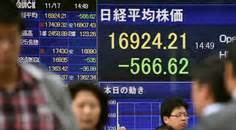 The economy in Japan shrank unexpectedly for the second straight quarter leaving the third largest economy in the world in a technical recession.
The economy in Japan shrank unexpectedly for the second straight quarter leaving the third largest economy in the world in a technical recession.
The Gross Domestic Product fell at an annualized rate of 1.6% from July through September, compared to forecasts expecting an increase of 2.1%.
That followed a contraction that was revised of 7.3% during the second quarter. That was the biggest drop since March of 2011 when the country was hit by an earthquake and subsequent tsunami.
Shinzo Abe the Prime Minister of Japan is expected to call an election to seek a mandate delaying the tax increase to 10% that is scheduled for 2015.
The increase in tax was legislated in 2012 by the previous government to curb the huge public debt in Japan, which is the highest amongst all developed nations.
In April, the first increase in sales tax took place from 5% up to 8%. That increase hit growth hard during the second quarter and appears to still be impacting the economy.
The economy contracted 0.4% during the third quarter.
Data also indicated that growth in private spending, which amounts to over 60% of the overall economy, was far weaker than had been expected.
Speculation has grown that Abe will call the election for December to gain widespread support only two years following his election.
Media in Japan now reports that Abe could announce the election as soon as Tuesday to be held December 14.
The government’s chief spokesperson on Monday said that Abe was expecting to make decisions on various steps that need to be taken amidst the severe situation economically.
While the popularity of Abe has fallen since 2011 when he took office, it is widely thought he would win if an election is called, since the opposition remains divided.
The dollar, in reaction to negative economic information, went above the 117 Japanese yen mark prior to retreating to 115.70.
The Nikkei 225 the benchmark index closed down nearly 3% marking its largest one-day fall since August.
